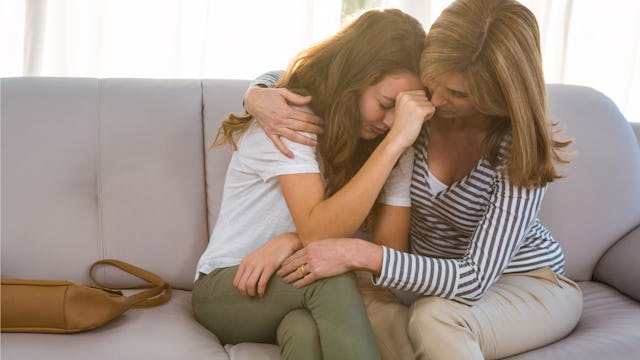The Hardest Thing About Parenting A Child With Anxiety

My teen daughter had been dreading her orchestra concert for weeks. She loves playing the violin and loves orchestra, but this particular concert was throwing her. It would be the longest she’d ever sat on stage, but it wasn’t the act of performing that had her freaked. It was a story about a kid throwing up in the middle of a concert — a story she’d heard from an orchestra director seven years ago — that haunted her.
My daughter has an anxiety disorder called emetophobia, which is a clinical fear of vomiting. No one likes to puke, of course, but for an emetophobe, the idea evokes a PTSD-type response and the fear of it affects everything. Anyone at any time could be carrying around a stomach bug and not know it. Any food at any time could be carrying foodborne illness. There’s no escaping the possibility of getting sick, so emetophobes are anxious almost all the time. It’s frequently misdiagnosed as generalized anxiety or panic disorder because the symptoms are the same, but the fear and panic all come back to a fear of vomiting.
So, a silly story about a kid barfing in the middle of an orchestra concert is enough to send my sweet girl into a spiral of debilitating anxiety. The normal and natural performance nerves make her stomach feel funny, which her brain starts interpreting as nausea. The perceived nausea makes her anxiety go through the roof, which then makes her stomach feel even worse, which makes her anxiety worse, and so on.
We knew the concert was going to be tough. We worked on relaxation techniques. She did her meditations and used other anxiety maintenance tools we’ve gone over a hundred times. She made it to and through the dress rehearsal. She even made it through the first half of the concert.
And then, at intermission, the panic struck. And after that, there was nothing we could do to get her back onstage. I spent the second half of the concert in the lobby with her while she tried to get her body and brain to stop wigging out. We’ve learned that when it’s that bad, we just have to wait it out.
That’s the worst part of parenting a child with an anxiety disorder — the feeling of helplessness when your child is suffering and you can’t fix it. I’m the Mommy, dammit. I’m the one who kisses the boo-boos to make the owies go away. But I can’t kiss this away. I can hold and encourage my daughter, I can try my best to get her the professional help she needs, I can remind her of the tools she’s practiced, but I can’t make the irrational fear go away when it strikes.
Anxiety is a tricky beast. My brain wants to use logic and reason to talk it down, but throwing logic at anxiety is like throwing paper airplanes at a fan. Nothing gets through. When I’m desperate, I start tossing out incentives both positive and negative, as if overcoming anxiety is an issue of motivation. Then I kick myself because of course it isn’t, and acting as if it is is totally unfair and completely unhelpful.
It’s hardest on my daughter, obviously. But it’s also really freaking frustrating to be the parent of a child with anxiety. I was relieved to hear from a friend who struggles with anxiety herself that she thinks being the parent of an anxious child is incredibly hard too. (Her daughter battles anxiety as well.)
In the parental role, you want to help, you want to fix it, and you can’t. Your child looks to you for help, you try everything at your disposal, and sometimes it’s not enough. You feel like you’re failing your kid. You feel helpless.
Helplessness as a parent feels an awful lot like sheer terror. I try to be strong for my daughter’s sake, to not let her see that it gets to me. The last thing I want her to think is that her anxiety is a burden to us. But I had to fight back tears at that orchestra concert. She had worked so hard, struggled so much to get herself there, but the anxiety won in the end. And I couldn’t do anything about it.
I told her I wasn’t upset at her, just frustrated — like she is — that she has to deal with this stuff. I told her I was proud of her that she even got there in the first place and that she tried her best. I told her that this wasn’t the end of the world and that sometimes treatment is a three-steps-forward, two-steps-back process. I told her not to give up on herself or her therapy.
Then I went home and cried in the bathroom.
Being the parent of a kid with anxiety — and I assume a kid with any mental illness — is tough. It’s time-consuming and energy-sapping, but I can deal with that. That’s just parenting plus some. But the helpless feeling, the knowing what’s wrong but not being able to fix it, that’s the part that gets me every time.
I hope our daughter always remembers that her parents were there for her, that she always feels supported by her family no matter what she’s going through. Sometimes that’s the only help we can offer in the moment.
And maybe — hopefully — in the moment, that’s enough.